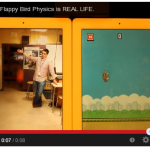In the Media
A diabolical psychologist brings a mathematician in for an experiment. The mathematician is seated in a chair on a track leading to a bed on which there is an extremely attractive person of the appropriate gender, completely naked. The psychologist explains "This person will do absolutely anything you want, subject to one condition: every five minutes, we will move your chair across one-half of the distance separating you."
The mathematician explodes in outrage. "What! It'll take an infinite time to get there. This is torture!" They storm out.
The next experimental subject is a physicist,…
Another Monday, another recap of a new episode of the Cosmos reboot. This one was all about optics, and much of it was excellent. This was in part due to the fact that its first couple of historical segments focused on non-Western figures, and I don't know as much about their background to be able to nitpick. First up was Mozi, a Chinese philosopher from circa 400BCE, who may have been the first to demonstrate the camera obscura technique of projecting images from a pinhole in the wall of a dark room. He was followed by ibn al-Haytham, circa 1000CE, who did the first fairly complete analysis…
The fourth episode of the Cosmos reboot aired last night, and as I said on Twitter it was a beautiful demonstration of why I'm finding this show intensely frustrating. There were flashes of brilliance, but also quite a few bits that left me shaking my head. Thus fitting the pattern of the previous episodes-- I didn't comment on last week's, because I was taking a break, but it had the same sorts of issues, too-- so I guess that's just what this show is.
Again, there was some very good stuff-- the opening framing device with William Herschel talking about ghosts was great, and Tyson's tour…
In which Rhett and I chat about the hot new discovery of primordial gravitational waves (maybe) very briefly before segueing into talking about LIGO, and Cosmos, and why "theory" is a terrible word, and the memorization of constants, and standardized tests, and time-lapse videos. You know, as one does.
Miscellaneous items:
-- I'm a little pixellated, as if I'm concealing my identity. I forgot to shut Kate's computer down, so it may have been doing online backups that chewed up bandwidth.
-- The von Neumann quote I butcher at one point is "The sciences do not try to explain, they hardly even…
This week's Cosmos was all about the evolution of life, and was viewed by millions of people outside of Oklahoma, where they presumably got an hour-long local news promo, or analysis of the Oklahoma State's chances in the NCAA Tournament. As such, it was a bit outside my area of expertise, but that never stopped a blogger before...
There were a couple of things about this that I thought were great, and two things that bothered me. The episode opened with a very nice discussion of the history of dogs and humans, demonstrating how dramatically untold generations of human selection have modified…
"So, that's the science show with space pictures. What did you think of it, honey?"
"Science. Space pictures. Awesome!"
Our umpteenth winter storm of the season delayed school two hours this morning, which is kind of the worst of all possible worlds from a parenting perspective-- when the schools are closed, there's (usually) a snow-day day-care program, but they don't take kids during a mere delay. On the bright side, though, it gave me a chance to show SteelyKid the Cosmos reboot from Sunday night. Her capsule review is at the top.
In a little more detail:
-- I asked her if she wanted to…
I alluded to this on Twitter, and meant to leave that be, but the other thing I was going to blog today didn't come together, and I probably shouldn't leave a cryptic tweet as my only comment. So...
One of the links getting passed around a lot in my social-media circles is this Tumblr post from Ben Lillie on The Humanities of Science Communication, which argues that discussions of the science of communication often seem to ignore the expertise of people who communicate for a living-- playwrights, actors, journalists, etc. This is a good point, but the post as a whole bugged me a bit, because…
In which Rhett and I talk about Cosmos. What, you thought there would be another topic? We have contractual obligations, you know...
Okay, there were some other topics like Battlestar Galactica (both versions), why so much of what's on Discovery Channel and TLC sucks these days, the flawed astrophysics of Firefly, speculation about how those little infrared thermometers work, and why some kinds of labs are hard.
And Cosmos again. Because, really, how could we not?
It says here in the fine print that my blogging license could be revoked if I fail to offer a public opinion on the Cosmos reboot, which premiered last night. I missed the first couple of minutes-- I had The Pip for bedtime, and he didn't start snoring until 8:58-- but saw most of it in real time. I posted a bit of commentary on Twitter, but will offer something marginally less ephemeral here.
The show opened and closed with tributes to Carl Sagan, and Neil deGrasse Tyson standing on the same cliff where Sagan opened the original series back in 1980. That was good and fitting, and Tyson's…
This year's "Flame Challenge" asks scientists to explain color in terms an 11-year-old can understand. The rules limit answers to either 300 words of text or a 6-minute video. 300 words is ridiculously short, so video is clearly the way to go. Of course, I'm not much of a video expert, but then, one of the finalists last year (when the question was "What Is Time?") was just a guy talking into a webcam, and hell, I can do better than that. So I did this:
(This is, obviously, why I was fooling around with looking at the spectrum of light from my laptop a little while back...)
The approximate…
Over at Backreaction, Bee takes up the eternal question of scientists vs. journalists in exactly the manner you would expect from a physicist: she makes a graph. Several of them, in fact.
It's generally a good analysis of the situation, namely that scientists and journalists disagree about how to maximize information transfer within the constraints of readership. That's a very real problem, and one I struggle with in writing the blog and books, as well. Lots of people will read content-free piffle, but if the goal is to convey good, solid science to as many people as possible, well, that's a…
I didn't advertise it heavily this time, but Rhett and I did another G+ hangout yesterday, and the video is online now:
We talked for a while about the wonders and importance of VPython coding (including some "Oh, I should totally do that..." moments), where we get post ideas (including a discussion of luge physics), briefly about how we put stuff together for posts, and a bit more about physics education research and why it's really difficult.
I had hoped to throw together a quick post about the luge thing for today, but that's probably not going to happen, so you'll have to settle for the…
One of the more annoying points of contention back in the days of the Sokal hoax and the "Science Wars" was an argument over social construction. This is, loosely speaking, the idea that our understanding of the world is not strictly rational and objective, but is heavily influenced by interactions with other people, and the culture in which we live. The idea originally arose in literary academia, but expanded to be applied to basically everything, including science.
At bottom, this is probably the best and most useful idea to come out of whatever collective "-ism" you want to use to refer…
This week's hangout with Rhett Allain, in which we talk about how we got into physics, how we find stuff to read, what we enjoyed on physics blogs this week, what we do and don't like about Twitter, and the revenge of the Sith.
The specific blog posts we mentioned:
Frank Noschese's analysis of gravity in Flappy Birds
Ethan Siegel on Hawking and black holes
Bee at Backreaction on what Hawking really said
Timothy Burke on "administrative bloat" and faculty control
Dr. SkySkull on infinite series
Physics Buzz apologizing for starting the infinite series thing
Matthew Francis on polarization in…
Unless you've been marooned on a desert island for the last couple of weeks-- or, you know, foreign-- you're probably at least dimly aware that the Super Bowl is this evening. This is the pinnacle of the football season, and also the cue for lots of people to take to social media proclaiming their contempt for the Super Bowl, NFL football, or just sports in general. This can occasionally be sort of amusing, as with Kyle Whelliston's "Last Man" game, but usually, it's just kind of tedious. The AV Club has pretty much the only necessary response, namely that Nobody Cares That You Don't Care…
When I wrote about Benjamin Bratton's anti-TED rant I only talked about the comment about the low success rate of TED suggestions. That was, admittedly, a small piece of his article, but the rest of it was so ludicrously overheated that I couldn't really take it seriously. It continues to get attention, though, both in the form of approving re-shares on my social media feeds, and in direct responses such as a rebuttal from Chris Anderson himself and most recently a long piece by Christiana Peppard at Medium, which are getting their own collection of approving re-shares. So I guess I ought to…
I've seen a bunch of links to this interview with Peter Aldhous, mostly focusing on this quote:
I think for most science journalists, their model of journalism is explanatory. It’s taking the arcane world of the high priests and priestesses of science and translating what they do into language the ordinary mortal can understand. And I think that’s incredibly valuable and very important if we’re to have an informed society. But it is a different mindset from thinking that part of your job is to keep an eye on these guys and check that science isn’t being used and abused, that there isn’t…
I am crushingly busy right now-- massive book rewrites needed, papers to grade, etc.-- so I've actually been fairly happy with the general lack of topics that inspire a deep desire to blog. which of course, was promptly upset this morning, when a brief outburst of hating on Carl Sagan erupted on Twitter just as I was about to head to the gym.
The catalyst was the hoopla surrounding the donation of Sagan's papers to the Library of Congress, which though it isn't specifically cited was the cause of a flurry of Twitter discussion that I think led to Erin Podolak's anti-Sagan manifesto, which in…
Over the weekend, before the whole Scientific America debacle blew up, Ben Lillie tweeted:
Looking for science news pegs that aren't "a paper was published." Good examples? #ScioOcean #scionew
— Ben Lillie (@BenLillie) October 12, 2013
This is, of course, a familiar problem to a lot of people who care about the public dissemination of science. The need for a good "hook" is a constant issue, because without one, you can't get anyone to pick up a story. And you can't let one get past, either, leading to a frantic scramble whenever anything happens that has the slightest connection to science…
Last week, before we headed out for the weekend, I had a brief exchange with Ben Lillie on Twitter, prompted by the following set of tweets:
OK, here's a thing. I'll often hear people complain that Hollywood gets science wrong because there's *1* scientist who does everything 1/3
— Ben Lillie (@BenLillie) September 27, 2013
But in reality, science is massively collaborative. So why can't storytellers get that right? 2/3
— Ben Lillie (@BenLillie) September 27, 2013
*BUT* at the same time we have, and wildly celebrate, the Nobel, which embodies exactly that myth. 3/3
— Ben Lillie (@BenLillie…





